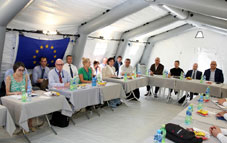
IPRM Meeting in Ergneti Highlights Eight New Cases of Illegal Borderization Since May 16
By Liza Mchedlidze
Wednesday, July 24, 2024
The 120th Incident Prevention and Response Mechanism (IPRM) meeting, held in Ergneti village, Gori, near the Tskhinvali region, focused on urgent issues related to illegal detentions and borderization activities. This forum included representatives from the Georgian government, the de facto Tskhinvali authorities, Russian occupation forces, and international organizations such as the European Union, OSCE, and the United Nations.
Irakli Antadze, Deputy Director of the Analytical Department of the State Security Service of Georgia, reported that eight Georgian citizens are currently detained illegally in the Tskhinvali region. He stressed the need for their immediate release and outlined ongoing humanitarian efforts to reunite them with their families. Antadze also addressed the case of Ramaz Begheluri, who was sentenced to eight months in prison by the de facto court for "border violations". He criticized the sentence as unlawful and noted that international partners are closely monitoring the situation.
Antadze also highlighted eight new instances of illegal "borderization" activities since May 16, 2024. These activities involve both the installation and repair of unauthorized border structures in the Gori, Kareli, and Dusheti municipalities. New installations and repairs were particularly observed near the village of Kodi and the occupied area of Tsnelisi. The Georgian delegation condemned these actions as serious violations.
"Of the eight cases, five occurred in May and three in June. These incidents affected the municipalities of Gori, Kareli, and Dusheti, including the Gremishkevi area. The activities involved both the reinforcement and repair of existing illegal border structures, as well as the installation of new ones. New installations were observed in the Gori and Kareli municipalities, primarily towards the village of Kodi, and similar activities were seen near the occupied area of Tsnelisi. While the scale of these activities varies, our position, shared with international partners, is that even a single instance of illegal borderization is a serious issue," said Antadze.

